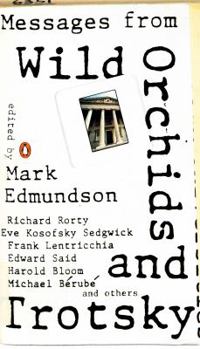Wild Orchids and Trotsky: Messages from American Universities
Select Format
Select Condition 
Book Overview
In recent years, liberal education has come under attack by such figures as Allan Bloom, Dinesh D'Souza, David Lehman, and others, who have criticized the growing radicalization of the American... This description may be from another edition of this product.
Format:Paperback
Language:English
ISBN:0140170782
ISBN13:9780140170788
Release Date:February 1993
Publisher:Penguin Group
Length:376 Pages
Weight:0.65 lbs.
Dimensions:0.6" x 5.5" x 8.4"
Customer Reviews
1 rating
Avenues of engagement
Published by Thriftbooks.com User , 19 years ago
Richard Rorty sees America as Dewey and Whitman did. The title of this collection of interviews and statements by literary critics is derived from the piece on Rorty. The child of Trotskyites, Rorty believes that reality and justice cannot appear in a single vision. Nancy Miller writes about becoming a feminist critic. Edward Said, Palestinian and Columbia professor of literature, took up the study of Derrida and Foucault. 1967 was a watershed year for him, and novels were all about new beginnings. Then he became disillusioned with Foucault. In 1972-73 he took daily tutorials on Arabic. Said tried to strike a balance between literacy, culture, and politics. Judith Frank teaches both noncanonical and canonical writers. William Kerrigan cites a theory explosion in the study of English in the 1970's. In historical scholarship Kerrigan began to notice that footnotes were thinning. Kerrigan's response to the theory explosion is to love literature and learning and nothing else. Michael Berube observes that to be engaged by theory is to be engaged by conflict among theories. Berube was liberated by Baktinian emphasis on narrative discourse. Wittgenstein held that the meaning of a word is its use in the language. For Derrida all utterances are dependent on context. Canonicity and neglect are historically significant phenomena according to Berube. He cites the cases of Thomas Pynchon and Melvin Tolson. Harold Bloom believes that Aristotle ruined Western literary criticism. At one time Bloom read Emerson and Freud concurrently and exclusively. He teaches Freud and Shakespeare. Bloom has said that Updike is a minor novelist with a major style. Bloom has taken over an idea of the agonistic from Burckhardt and Nietzsche. Susan Fraiman notes that women have been virtually excluded from the canon. A feminist scholar, Susan Fraiman is now teaching at the University of Virginia English department in the midst of a demographic shift in the academy. Edith Wharton has now emerged as an author in her own right, not as a lesser Henry James. The question is who gets to decide what counts as quality. It is contended there is no evidence that the faculty has abandoned traditional texts. Formerly out groups do not Balkanize themselves in the academy. Eve Kosofsky Sedgwick says gay- lesbian studies is haunted by the suicides of adolescents. Sedgwick speaks of a sort of visceral identification with some kinds of writing. Students have bones to pick with the teachers and each other in the gay and lesbian courses. Houston Baker Jr. thinks that rap may create new room for new people. Rap is the poetry of youth. It uses the collage style. J. Hillis Miller contends that Matthew Arnold feared anarchy because he experienced it in himself. Arnold always gives the reader the tools to dismantle affirmations. Richard Poirier opines that getting to work in the field of Emerson studies means being actively involved with words. This is





